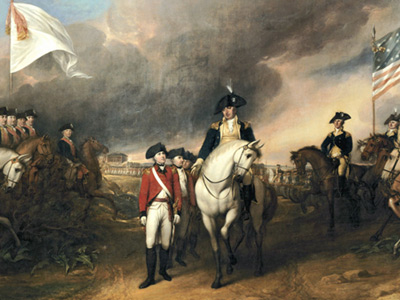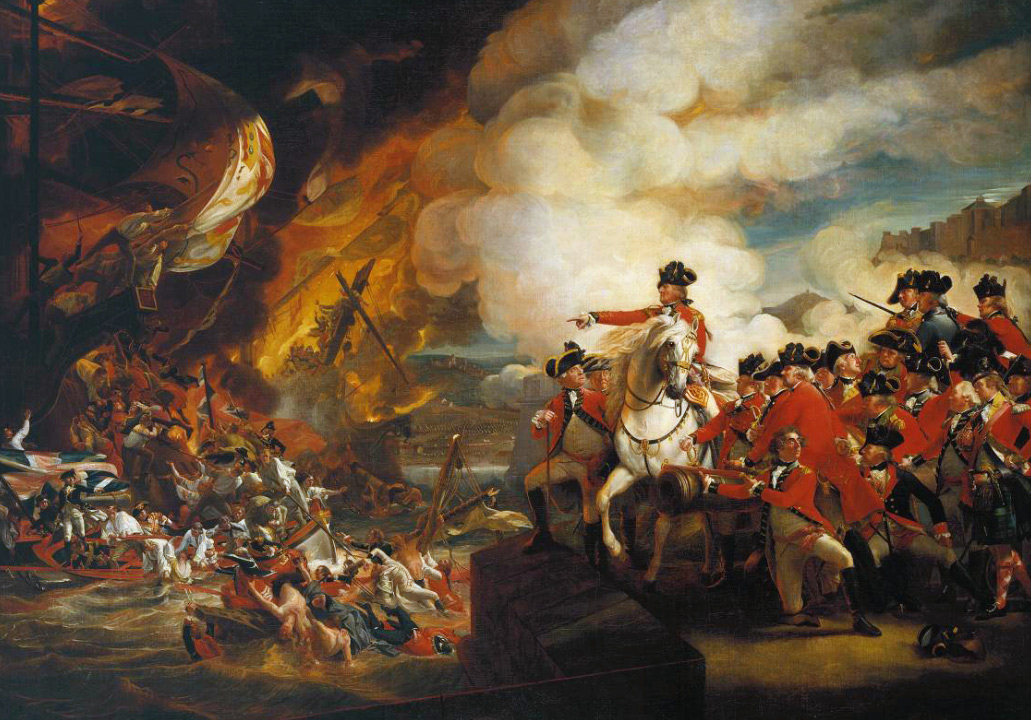American Revolutionary War (1775–1783)
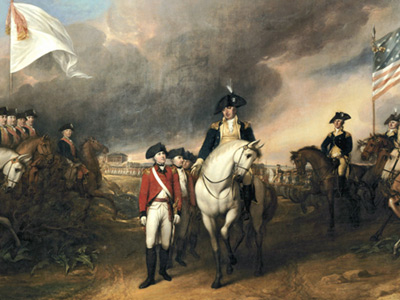
War Breaks Out (1775–1776)
On April 18, 1775, 700 troops were sent to confiscate militia ordnance stored at Concord. Fighting broke out, forcing the regulars to conduct a fighting withdrawal to Boston. Overnight, the local militia converged on and laid siege to Boston. On March 25, 4,500 British reinforcements arrived with three senior generals; William Howe, John Burgoyne and Henry Clinton. On June 17, the British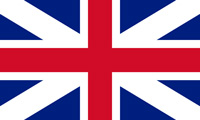 The Kingdom of Great Britain was a sovereign country in Western Europe from 1 May 1707 to the end of 31 December 1800. The state was created by the 1706 Treaty of Union and ratified by the Acts of Union 1707, which united the kingdoms of England (which included Wales) and Scotland to form a single kingdom encompassing the whole island of Great Britain and its outlying islands, with the exception of the Isle of Man and the Channel Islands. seized the Charlestown peninsular after a costly frontal assault, leading Howe to replace Gage. Many senior officers were dismayed at the attack which had gained them little, while Gage wrote to London stressing the need for a large army to suppress the revolt. On July 3, George Washington took command of the Continental Army besieging Boston. Howe made no effort to attack, much to Washington's surprise. After a plan to assault the city was rejected, in early March 1776, the Americans fortified Dorchester Heights with heavy artillery captured from a raid on Fort Ticonderoga. On March 17, the British were permitted to withdraw unmolested, sailing to Halifax, Nova Scotia. Washington then moved his army to New York.
The Kingdom of Great Britain was a sovereign country in Western Europe from 1 May 1707 to the end of 31 December 1800. The state was created by the 1706 Treaty of Union and ratified by the Acts of Union 1707, which united the kingdoms of England (which included Wales) and Scotland to form a single kingdom encompassing the whole island of Great Britain and its outlying islands, with the exception of the Isle of Man and the Channel Islands. seized the Charlestown peninsular after a costly frontal assault, leading Howe to replace Gage. Many senior officers were dismayed at the attack which had gained them little, while Gage wrote to London stressing the need for a large army to suppress the revolt. On July 3, George Washington took command of the Continental Army besieging Boston. Howe made no effort to attack, much to Washington's surprise. After a plan to assault the city was rejected, in early March 1776, the Americans fortified Dorchester Heights with heavy artillery captured from a raid on Fort Ticonderoga. On March 17, the British were permitted to withdraw unmolested, sailing to Halifax, Nova Scotia. Washington then moved his army to New York.
Meanwhile, British officials in Quebec began lobbying Native American tribes to support them, while the Americans attempted to maintain their neutrality. Fearing an Anglo-Indian attack from Canada, Congress authorized an invasion of Quebec. Quebec, with a largely Francophone population, had only been under British rule for twelve years, and the Americans expected that liberating them from the British would be welcomed. After an arduous march, the Americans attacked Quebec City on December 31, which was decisively defeated. After a loose siege, the Americans withdrew on May 6. 1776. A failed counter-attack on June 8 ended American operations in Quebec. However, the British could not conduct an aggressive pursuit, due to the presence of American ships on Lake Champlain. On October 11, the British defeated the American squadron, forcing the Americans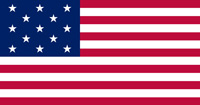 The United States of America (USA), is a country in North America. The American Revolutionary War (April 19, 1775 - September 3, 1783) was the military conflict in which American patriot forces under George Washington's command defeated the British, establishing and securing the independence of the United States. After the Revolution, the United States gained independence, the first nation-state founded on Enlightenment principles of liberal democracy. to withdraw to Ticonderoga, ending the campaign. The invasion cost the Patriots their support in British public opinion, while aggressive anti-Loyalist policies diluted Canadien support. The Patriots continued to view Quebec as a strategic aim, though no further attempts to invade were ever realized.
The United States of America (USA), is a country in North America. The American Revolutionary War (April 19, 1775 - September 3, 1783) was the military conflict in which American patriot forces under George Washington's command defeated the British, establishing and securing the independence of the United States. After the Revolution, the United States gained independence, the first nation-state founded on Enlightenment principles of liberal democracy. to withdraw to Ticonderoga, ending the campaign. The invasion cost the Patriots their support in British public opinion, while aggressive anti-Loyalist policies diluted Canadien support. The Patriots continued to view Quebec as a strategic aim, though no further attempts to invade were ever realized.
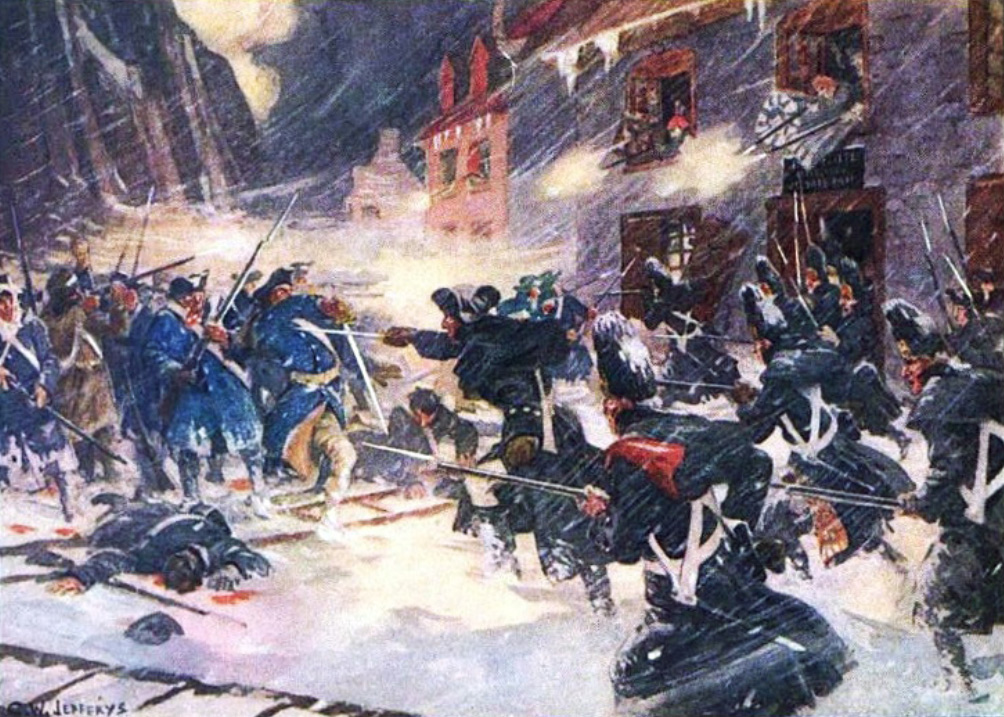
British soldiers and Provincial militiamen repulse the American assault at Sault-au-Matelot, Canada, December 1775
In Virginia, the Royal governor, Lord Dunmore, had attempted to disarm the militia as tensions increased, although no fighting broke out. After war broke out, Dunmore issued a proclamation on November 7, 1775, promising freedom for slaves who fled their Patriot masters to fight for the Crown. After Dunmore's troops were overwhelmed by Patriots at Great Bridge, Dunmore fled to naval ships anchored off Norfolk. After negotiations broke down, Dunmore ordered the ships to destroy the town. In South Carolina, fighting broke out on November 19 between Loyalist and Patriot militias, and the Loyalists were subsequently driven out of the colony. Loyalists recruited in North Carolina to reassert colonial rule in the South were decisively defeated, subduing Loyalist sentiment. An expedition of British regulars to reconquer South Carolina launched a failed attack on Charleston on June 28, 1776, effectively leaving the South in Patriot control until 1780.
The shortage of gunpowder had led Congress to authorize an expedition against the Bahamas Colony in the West Indies, in order to secure ordnance there. On March 3, 1776, the Americans landed after a bloodless exchange of fire, and the local militia offered no resistance. For two weeks, the Americans confiscated all the supplies they could load, and sailed away on March 17. After a brief skirmish with the Royal Navy frigate HMS Glasgow on April 6, the squadron reached New London on April 8.
HISTORY
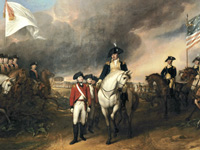
RESOURCES
This article uses material from the Wikipedia article "American Revolutionary War (1775–1783)", which is released under the Creative Commons Attribution-Share-Alike License 3.0.
© Stories Preschool. All Rights Reserved.
